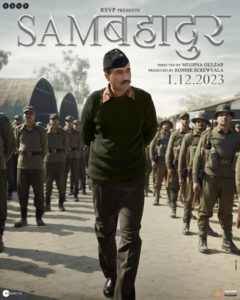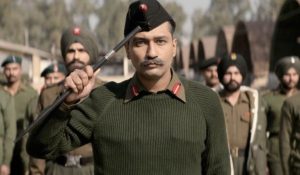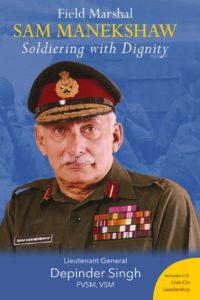Director: Meghana Gulzar
Script: Meghana Gulzar. Bhavani Iyer. Shantanu Srivastava.
Cast: Vicky Kaushal. Sanya Malhotra. Fatima Sana Sheikh
Genre: Biography and War Drama
Platform: Theatrical release
Duration: 2 Hours 30 minutes
A biography is always a difficult task for a filmmaker. What to show and what not to show. There is the trap of the film becoming a total hagiography or even diverting the attention away from the person’s genuine achievement to something inane and frivolous of which last week’s release, Napoleon, is the perfect example (Napoleon’s love affair vs his conquests and forming the Uniform Civil Code).
 Sam Bahadur, a look at India’s greatest soldier, Field Marshal S.H.F.J.Manekshaw, is a decent film that walks the thin lines between hagiography, biography, comic book and serious cinema. No doubt the film is engaging, yet there is a feeling that something is missing. We want to know more about “Sam” the man, rather than the somewhat two-dimensional “tough career soldier” template. Patton (1970) is an excellent example of a biography showing the mercurial, temperamental and self-righteous leader who was a great soldier but an absolute exasperation for his seniors and juniors. On screen, Patton emerged as a man no one liked as a person; yet they were in awe of his military leadership.
Sam Bahadur, a look at India’s greatest soldier, Field Marshal S.H.F.J.Manekshaw, is a decent film that walks the thin lines between hagiography, biography, comic book and serious cinema. No doubt the film is engaging, yet there is a feeling that something is missing. We want to know more about “Sam” the man, rather than the somewhat two-dimensional “tough career soldier” template. Patton (1970) is an excellent example of a biography showing the mercurial, temperamental and self-righteous leader who was a great soldier but an absolute exasperation for his seniors and juniors. On screen, Patton emerged as a man no one liked as a person; yet they were in awe of his military leadership.
When the credits come onscreen, the legend ‘creative liberty” is shown. I mentally banged my head on an invisible wall. Fully prepared for the worst, I was surprised how well all the major “touch points” of Sam’s career were covered in chronological order, almost like a PowerPoint presentation.
- Sam enrols in the Indian Military Academy. (The IMA was set up to train Indian officers without the need to send them to the UK). Soon, Sam is up to mischief and is caught, demoted and punished.
- Meets and marries Siloo Bodey.
- Posted to the Frontier Force which soon finds itself in action in Burma against the invading Japanese. Grievously wounded in action, Sam is awarded the Military Cross.
- In 1947, he is posted to the Military Operations directorate and was responsible for the division of military assets between India and Pakistan.
- Travels with V.P. Menon to Srinagar to finalise the instrument of accession by the Maharaja of Kashmir.
- Posted to Willingdon Staff College Ooty, where he runs up against the clique of Lt Gen. B.M.Kaul and Defence Minister V.K.Krishna Menon, which almost derails his career due to the serious allegations they bring against him for being insubordinate and anti-national.
- Just after the October 1962 debacle, posted to North-East where he improves morale and the fighting spirit of the troops
- In 1971, he is The Man of the Hour, as he seeks and surprisingly is given the time to prepare for the Bangladesh War, which he wins with careful planning along with the Air Force and Navy.
- Promoted to Field Marshal, he retires in 1973
As I said, the film feels like a PowerPoint presentation where all these “touch points” are mentioned and then expanded in detail to show his prowess as a leader and soldier. His habit of calling everyone “sweety” almost results in a misunderstanding with a lady journalist but that is soon corrected.
So, who was Sam Manekshaw? The witty Parsi man who dealt with all situations with a mix of humour and grit? The no-nonsense, outspoken officer who told the politicians to manage the politics while he would manage the Army? The tough leader who said, “There will be no more retreat without any written orders, and no such order will be issued by me”? Why will a common soldier be ready to die for a General?
More such questions remain unanswered. Since the emphasis is on Sam Bahadur and Sam only, there is no mention of his brothers and father who also served in the Armed Forces during and after World War 2. None of his siblings – four brothers and two sisters – are mentioned anywhere. Sam emerges as an only child, and here, the danger of hagiography looms large. His relationship with the civil Babus and Ministers was always fractious, and this is covered to some extent by how he tells the politicians to mind their own business.
One of the most famous incidents is covered neatly and in a very clever way. Mid-1971, due to repeated troop movements to the border areas, through Delhi, rumours of a coup were running amok in Delhi Bureaucracy. Sam’s old enemies whispered to Prime Minister Indira Gandhi who summoned him and asked him point blank whether he was planning a coup. He replied with characteristic humour, “I am capable but I don’t want to”. Here the same incident has Sam answering, “neeyat aur kabliyat me fark hai. There is a big difference in intention and capability. I have no intention”.

The film ends with his retirement as Field Marshal and doesn’t go further. Neither is there any mention of his utterly shoddy treatment by the Babus who stopped his allowances which were not given for almost 30 years. It took the intervention of President Kalam to get all his arrears together and hand him a cheque in 2007, a year before he died in 2008[1]. His greatest legacy is that he was perhaps the only military leader who showed some spine and was ready to dissent with the civilian leadership.
Sam emerges genuinely as a larger-than-life figure and Vicky Kaushal makes him more so with his superb performance. It would be correct to say that Kaushal raises the film from an almost hagiographic feel to that of a capable leader who was the man of the moment in the 1971 war. Unfortunately, Fatima Sana Sheikh’s portrayal of Indira Gandhi is dull and one-dimensional – a person who always has a questionable frown on her face. Saniya Malhotra has a smaller role as Siloo, but she emerges as a concerned and worried wife.

In the last half of the film, Sam teaches his military Aide Colonel Dipendra “Dipy” Singh, the “battles” that have to be fought in the “Delhi Front”. “Dipy” pays handsome tribute to his boss with this superb book on leadership, Soldiering with Dignity. There are intricate stories of how Sam manages to even use “chamchas” as he tells Dipy that he hates Chamchas but knows how to use them. How Sam deals with “middlemen” and the Civilian Bureaucracy who are more concerned with their position and “respect” than getting the job done. For anyone even remotely wondering what leadership is, this is an excellent book that should be on every leader’s shelf, whether they are civil or military leaders.
The battle scenes in World War 2 are decently done though the Jeep and Shaktiman trucks shown were unavailable in early 1942. Most other battle scenes are shoddy as the troops attack in a wave. But this is not a war movie; the battle scenes are meant to show what was happening at the borders while Sam fought other battles at the Delhi Front.
Overall, the film is engaging. Yet there is a sense that something is missing. Probably another case of style over substance? Meghana Gulzar should have probably written at least two or three more scenes for us to understand who Sam Bahadur was!
Real history/background – 4 out of 5
Script – 3 out of 5
Direction – 4 out of 5
Photography – 4 out of 5
Total – 3.8 out of 5
[1] https://www.dnaindia.com/india/report-field-marshal-manekshaw-receives-pay-arrears-of-rs116mn-1091704
Leave a Reply
Want to join the discussion?Feel free to contribute!